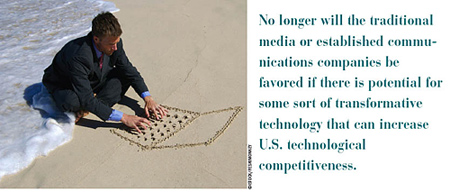The Hope of Broadcasters
With Barack Obama's historic victory just sinking in, speculation is already in high gear as to what his administration will mean for broadcasters. Will the Obama Administration mean more regulation? Or will it be a transformational one, looking at issues far beyond traditional regulatory matters to a broader communications policy that will help the communications sector to drive the economy?
Some guesses and some hopes are as follows… In most administrations, the appointment of the FCC chairman is the defining moment in establishing a president's communications policy.
The appointment of Kevin Martin shaped FCC policy toward broadcasters in a way that would never have been expected in a Republican administration, with regulatory requirements and proposals unimaginable four years ago. These initiatives can be directly attributed to the agenda of the chairman rather than to the president. But perhaps an Obama Administration will be different.
U.S. DEPARTMENT OF TECHNOLOGY

One of the specific proposals of the Obama campaign was the promise to appoint a chief technology officer to a cabinet-level position to help coordinate policy across the many government agencies that deal with technology and communications. This position would be designed to develop policies to enhance the competitive position of the United States in the worldwide technology revolution.
Clearly, such a position will create a new executive-level focus on communications policy that will affect the workings of the FCC. How will this focus affect broadcasters? One might have a glimpse of regulatory actions that could be expected from an Obama FCC with the unanimous bipartisan decision on Election Day approving the use of unlicensed devices in the television band, (though hopefully not an example of the procedures for making that decision).
No longer will the traditional media or established communications companies be favored if there is potential for some sort of transformative technology that can increase U.S. technological competitiveness. But the hope for an Obama Administration is that the rhetoric of a transformative candidacy, one geared toward uniting the various divides of the country, will seep into the broader workings of the administrative agencies in Washington.
That the pitched battles of one industry versus another, or one partisan viewpoint over another, will be replaced by a more cooperative spirit that encourages compromise. That it brings a new openness to government that will allow real discussion to take place on issues, rather than decisions being made based on agendas set in stone before the evidence is in and the arguments made.
A FAIR SHAKE
To be more specific, one would hope that an Obama Administration would be open to recognizing that we have a pretty incredible broadcast service in this country—one that can rapidly adapt to disasters and shape itself to the needs and desires of the audience.
While there have been excesses here and there, these tend to be self-correcting, as witnessed by the recent divestitures of many radio and television stations by big groups. This has helped bring back some of the localism lost by the industry's rapid consolidation earlier this decade.
Some have feared that the return of a Democratic FCC will result in the kinds of nitty-gritty broadcast regulation that has been advocated by some quarters of the Democratic Party. E.g., a return of the Fairness Doctrine, detailed programming disclosure requirements that impose great costs without any discernible regulatory benefit (adopted, but not yet implemented), or other specific regulations that increase government mandates without corresponding benefits.
But I am hopeful that an Obama Administration would not be one to adopt unproductive regulation. Clearly, the Obama Administration will want to stress inclusiveness and opportunity for all in the media, and will look for ways to encourage minorities and other new entrants into broadcast ownership. Many members of the minority community have opposed the kinds of recent localism obligations attributed to the Democratic commissioners.
Minority broadcasters and other new entrants realize that broadcasting is a business that must generate a profit. Specific, detailed regulation takes flexibility and innovation away from broadcasters, and usually impacts small broadcasters more than large conglomerates. So an administration that wants to encourage new owners can't engage in a wholesale re-regulation of the broadcast industry.
NO MORE FREE REIGN
Do I expect some more regulation? Of course, but that seems to be a reaction to the current climate for all industries. There seems to be a general consensus that that the philosophy of deregulation may have gone too far.
But I would look for regulation around the edges that impose some public interest obligations on broadcasters, but that can be lived with—not ones imposed simply for the sake of regulating, imposing a crushing burden on small business. The rumors about potential FCC commissioners in the new administration are flying.
Many of the supposed candidates have worked with past Democratic commissions, and many have spent time in the business community since leaving the FCC and are thus familiar with meeting a payroll and the costs of regulation.
I believe that right now, we should keep hope alive and look at the Obama Administration as one that may bring a new emphasis to the communications world while not unduly burdening those that are already operating in that world. It is a new day—let's hope that it is indeed a brighter one for broadcasters.
David Oxenford is a veteran media attorney with Davis Wright Tremaine LLP in Washington, D.C. He can be reached at davidoxenford@dwt.com, 202- 973-4256, and his blog is available at www.broadcastlawblog.com.
The professional video industry's #1 source for news, trends and product and tech information. Sign up below.
